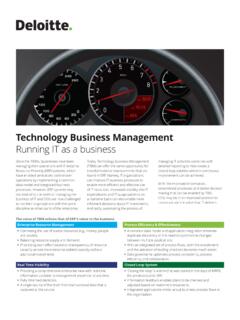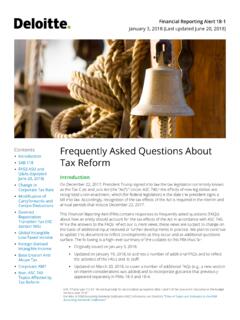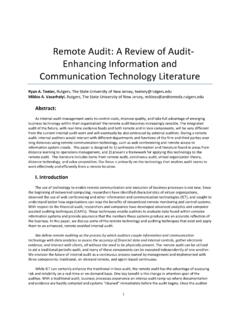Transcription of Zero-Based Budgeting: Zero or Hero? - Deloitte
1 Zero-Based Budgeting: zero or Hero? IntroductionFor many organizations, the thought of rebuilding the company budget from the ground up can be nightmare-inducing. Wiping the financial slate clean and starting from scratch would be a last resort in a worst-case scenario, never an option to be considered under normal circumstances. Yet starting around 2008, an increasing number of organizations chose to do exactly that. Faced with an economic recession, both public and private corporations began to turn towards an extreme method of budgeting known as Zero-Based budgeting , or is a budgeting process that allocates funding based on program efficiency and necessity rather than budget As opposed to traditional budgeting , no item is automatically included in the next In ZBB, budgeters review every program and expenditure at the beginning of each budget cycle and must justify each line item in order to receive funding. Budgeters can apply ZBB to any type of cost: capital expenditures; operating expenses; sales, general, and administrative costs; marketing costs; variable distribution; or cost of goods When successful, ZBB produces radical savings and liberates organizations from entrenched departments and When unsuccessful, the costs to an organization can be considerable.
2 Zero-Based budgeting : zero or hero ? 2 Though the private sector uses ZBB,6 ZBB first rose to prominence in government during the 1970s financial crisis. Faced with mounting public pressure, President Jimmy Carter promised to balance the federal budget and reform the federal budgeting system using ZBB, which he had used while governor of Georgia. Though initially well received, ZBB proved not only complicated and time consuming, but also ineffectual,7 as it was Congress and the executive branch that were ultimately responsible for deciding whether to keep or eliminate a Additionally, the president s budget office used a variant of ZBB as agencies were asked to rank their programs within funding forced the agencies to assign priorities and identify possible reductions. However, this meant that rather than starting from a true zero base as ZBB would suggest, the agencies would start from a priority base ( , 80-85% of the current year).
3 9 President Reagan abandoned the system after his election in Since then, ZBB s use in both the public and private sectors has been limited due to its high level of complexity and large requisite investment that can hinder its Rising PopularityZBB has recently experienced a resurgence of interest in both the public and private sectors. In the public sector, this stems largely from contemporary fiscal constraints precipitated by the 2008 recession. Facing budget cuts and increased public scrutiny, government agencies have been using alternative budgeting methods such as ZBB instead of more traditional budgeting methods such as line-item and incremental A survey by the Government Finance Officer Association (GFOA) shows that over 20% of respondents are using ZBB or ZBB components, which represents a 50% increase compared to the period just before the 2008 cost reduction is a historically common tactic for private corporations seeking to free capital for investment in growth opportunities, restrictive budgeting practices have also witnessed an uptick in the private sector.
4 For the 85% of CFOs who report above average levels of volatility and uncertainty since the 2008 recession,13 restrictive budgeting , including ZBB and its components, represents an opportunity to mitigate risks by using aggressive cost reduction to support growth14 while reassessing both short- and long-term budgeting (ZBB)A budgeting process that allocates funding based on program efficiency and necessity rather than budget history Prevents embedding of existing spend in the cost base Allows spending levels to be set based on necessary activities of a function, rather than historical trends Requires more work to understand activities and cost structure Better aligns spending targets with required activities of a function Replaces do more with less with do the right things with the right amount Requires fairly detailed knowledge of departmental activities and willingness to do less or discontinue activities Eliminates common sandbag-ging practices in budgeting process Allows for more strategic allocation of planned spend Requires more work to analyze and prioritize activities and expenditures Allows for better alignment of expenditure with overall strategy and departmental missions Can reduce incidence of we ve always done that Prioritizing activities across various functions can be challengingBudgets are not connected to prior year spendingBudgets are tied to specific activities and levels of serviceSpending increases or cuts are not
5 Simply spread evenly across budgetsFunding is targeted more to activities that align with the strategyFig. 1: Explaining Zero-Based budgeting (ZBB)5 Zero-Based budgeting : zero or hero ? 3 Potential Benefits For organizations looking to grow by releasing capital through improved cost management, ZBB offers appealing possibilities for reducing costs while bringing additional value in the form of operational efficiency. In a best case scenario, ZBB may reduce SG&A costs by 10 - 25% within six The potential impact can be especially pronounced in the public sector, where ZBB could theoretically encourage Congress to only pay for necessary and efficient programs as opposed to sanctioning automatic increases in government could be especially insightful when applied to programs and agencies that claim the biggest portions of government funding. For instance, while defense spending for 2016 was originally set at $523 billion, Congressional support for additional spending increases will bring total defense funding for that year to $619 This $96 billion increase will occur on top of the previous budget, without adjustment for any previous fluctuation in needs or priorities.
6 If government agencies were to actively seek an accurate base budget before spending increases were applied, additional funding could be allocated more effectively and , by forcing agencies and lawmakers to actively prioritize each program, ZBB could increase organizational efficiency by encouraging stakeholders to work together to analyze In turn, this forces cost centers to identify their mission and priorities,20 which helps align resource allocations with strategic Furthermore, by creating a budget and baseline from zero , government agencies would benefit from perceived increases in transparency and accountability both internally within their organization and externally with the private sector can benefit in the same ZBB can help companies confront conventional thinking and resource allocations by challenging every line item and assumption. In the case of organizations that are overly complex due to mergers or acquisitions, ZBB can be especially useful.
7 Leading global companies are currently implementing ZBB across their entire organizations to support aggressive savings The private equity firm 3G has consistently used the same Zero-Based approach on its acquired companies, most recently with AB InBev and Heinz. In both cases, this was one of the first strategies implemented by the private equity firm: a radical change to their budgeting process with the goal of delivering and retaining significant has continued to hit the spotlight in recent months with large deal announcements as well as its aggressive use of ZBB. In the case of Heinz, 3G moved to close plants across the country and eliminated more than 1,000 Furthermore, Unlike with typical private-equity firms, 3G s founders like to invest for longer than the standard five-to-seven-year time frame, 27 which allows for a more systematic implementation of and RisksZBB presents an opportunity for organizations to cut costs and improve quantitative and qualitative aspects of operations, but completing a full ZBB cycle can be both challenging and risky for most organizations.
8 Prioritizing program needs can be threatening to some managers,29 and can prove problematic for departments with intangible outputs. Most significantly, the process itself is costly, complex, and time Especially compared to traditional budgeting , ZBB requires extra time and specialized training, both of which represent added costs to an organization that may already be pressed for ZBB may pose a risk to a company s brand. While ZBB in and of itself will not necessarily harm a company s brand, implementing ZBB can pose risks to customer experience and a company s ability to price at a premium. For organizations that depend on high levels of service to maintain brand and premium pricing, pivoting to a more cost-restrictive approach could cause an unintended culture shift by changing attitudes towards cost. The new cost mindset could undermine or prohibit the very enablers of the organization s former brand prestige and pricing power.
9 Cutting costs deemed non-core to a company s operations that are in fact core to its customers experience could harm the brand and 2: Advantages and Disadvantages of ZBB28 Zero-Based budgeting Resulting budget is well justified and aligned to strategy Catalyzes broader collaboration across the organization Supports cost reduction by avoiding automatic budget increases, often resulting in savings Improves operational efficiency by rigorous challenging of assumptions Costly, complex, and time consuming as budget is rebuilt from scratch annually, whereas simpler and faster traditional budgeting requires justification only for incremental changes May be cost-prohibitive for organizations with limited funding Risky when potential savings are uncertain Execution challenged by budget cycle timing constraints Typically requires specialized training or personnel to accomplish, and requires more resources in general May be disruptive to the organization s operations Could harm organizational culture or brandAdvantagesDisadvantages Zero-Based budgeting : zero or hero ?
10 4 For the public sector in particular, it can be difficult to scrutinize all of an organization s programs within the time constraints of a budget cycle. Government agencies that use ZBB tend to pull staff/resources off of their day-to-day activities, or give them double duty to support ZBB activities. This can make an already complex process even more challenging, especially when coupled with learning how to conduct ZBB on the fly. Also, agencies often already have established processes for conducting regular program effectiveness reviews on a periodic basis ( quarterly, annually, or tied to certain milestones in a program). In these instances, ZBB can be disruptive, potentially to a prohibitive degree. In response to these challenges and constraints, both private corporations and federal agencies can and do mitigate the risks of a full ZBB cycle by adopting aspects of ZBB on a select function In the public sector, having a team comprised of consultants, advisors, and government personnel can accelerate the ZBB process by breaking down barriers, translating program-related information, and gathering data.














